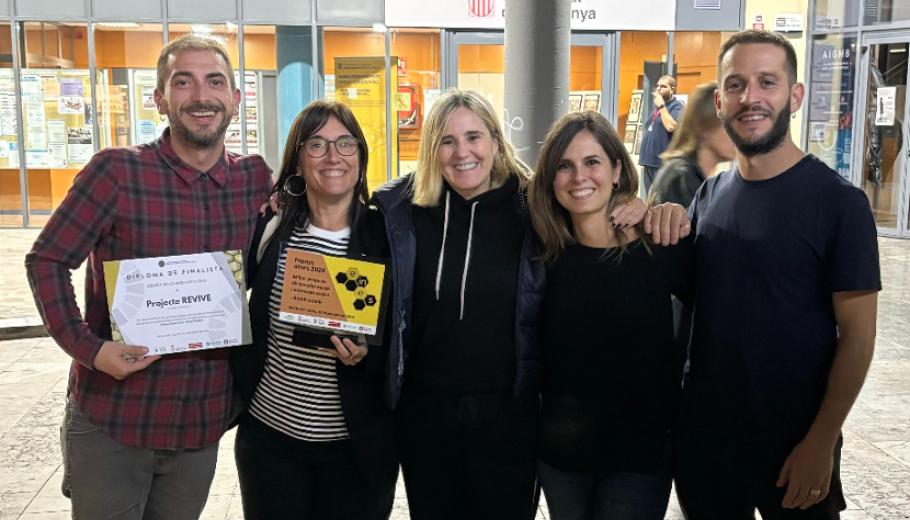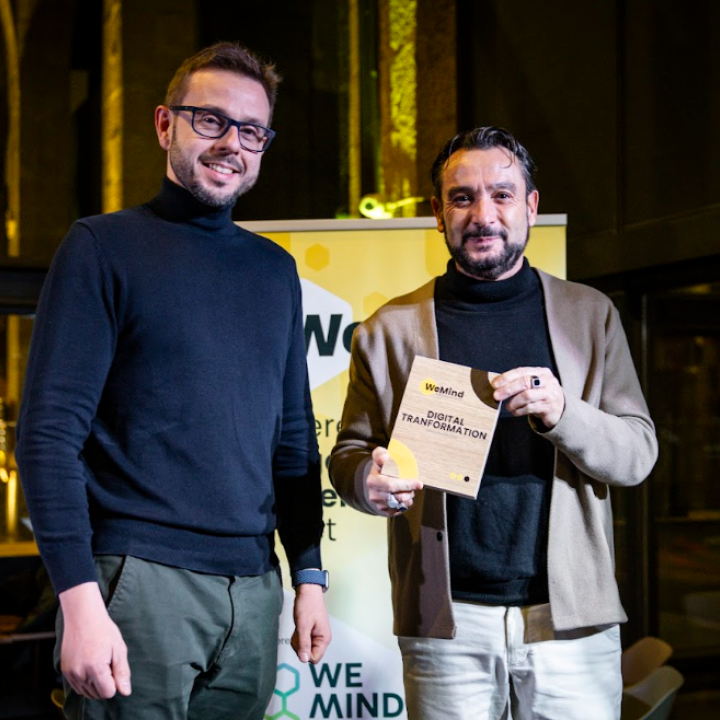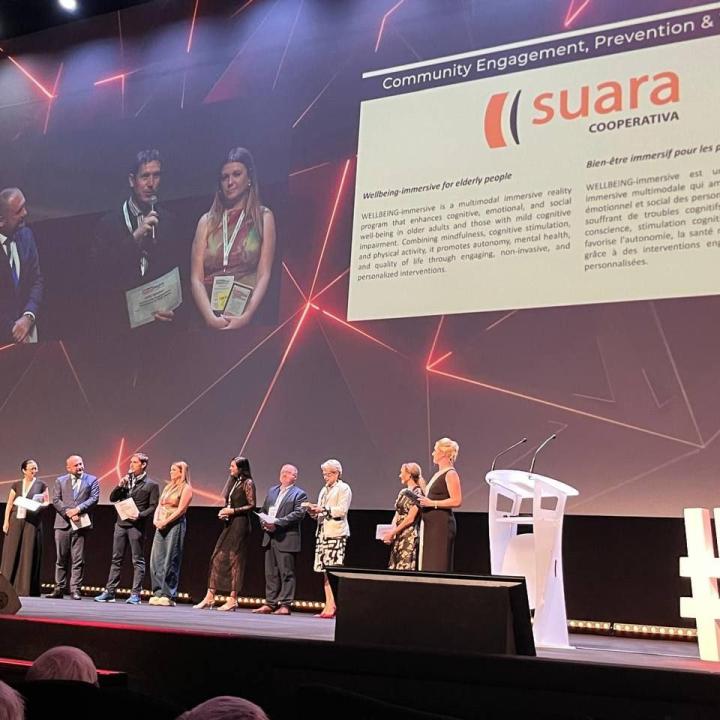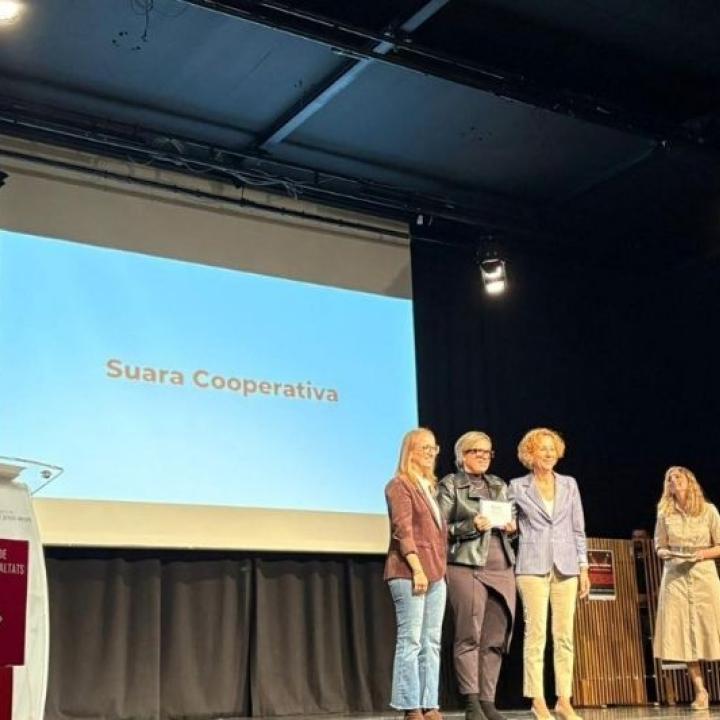In an official event attended by the Minister for Equality and Feminism, Eva Menor; the innovative model of this program was recognized, which slows down the cognitive and physical deterioration that can occur in the aging process.
Suara Cooperativa has won the Eines 2024 prize with the REVIVE project, an immersive reality program for the elderly that contributes to slowing the cognitive and physical deterioration that can be triggered by aging processes. These awards are promoted by the Chair in Entrepreneurship and Social Innovation promoted by the Autonomous University of Barcelona, Mollet del Vallès City Council, Vallès Occidental Regional Council, Vallès Oriental Regional Council and the Provincial Council of Barcelona in the category of Catalonia,
Jordi Blanco and Mireia Miralles, from the Innovation area of Suara Cooperativa, collected the award this Tuesday, in an event at the Antonio Díaz-El Mago Pop auditorium in Badia del Vallès, officiated by the Minister of Equality and Feminism of the Generalitat, Eva Menor; and the rector of the UAB, Javier Lafuente. This award, says Miralles, will allow to continue developing projects with immersive reality. "We will continue to explore and promote improvements in this area, such as acquiring and updating technological equipment; develop new immersive content; and continue the training of professionals in the use of technology", points out Miralles.
For its part, the UAB has highlighted in a statement published on its website that "REVIVE has established itself as an innovative stimulation model with scientific validity".
In detail, this project that Suara Cooperativa has developed through its Social Digital Lab innovation laboratory and in inter-cooperation with the technological startup Broomx and the Cervell, Cognició i Conducta research group of the Consorci Sanitari de Terrassa, uses immersive reality to recreate real environments that work on people's cognitive and physical state while also including experiences with relaxation and mindfulness techniques. An innovative technology that improves the cognitive and physical state and the psychological and emotional well-being of the elderly.
Other benefits of REVIVE
The REVIVE sessions, led by an expert, are held in groups and, in this way, it has also been possible to combat another of the social challenges linked to aging: unwanted loneliness, since the people who participate in the program they end up weaving a social network.
This, however, is not the only challenge to which REVIVE responds, but also allows to break different gaps such as digital by bringing this technology closer to a group that does not usually have access to it. With this, it encourages the inclusion of older people in today's digital society.
"Projects like REVIVE can make a difference in the lives of the elderly and those with cognitive impairment. This is a journey towards a more inclusive and healthy future, where technology and empathy come together to improve the well-being of our society", Miralles defends.
Universities for social transformation
In addition to REVIVE, this year the Retícula project, a social and free image bank that breaks with stereotypical narratives, also received the Tools prize in the Valais area category, as well as in the local sphere Obrador, the patisserie of El Bosc Occupational Center.
During the presentation of the awards, both the councilor and the rector emphasized the need to provide answers to the challenges we face as a society. "We must work on social transformation to achieve true equality among all people," Menor emphasized.
For his part, Lafuente emphasized the need for the academic world to connect with society. "The university is nothing if it does not manage to become an engine of transformation in its environment", he defended.
Precisely, this is the philosophy of the Social Digital Lab, which following the working model of the quadruple helix of the European Living Labs, generates co-creation spaces where companies and startups in the technology sector, universities, research institutes, the public administration and the public cooperate to design and implement innovative solutions to a social challenge.
In this process, all parties are essential: citizens are the ones who know their needs and with whom the solution is tested so that it is optimal and suitable for their reality; companies develop the technology; the public administration has the capacity to act as a bridge between all agents and implement solutions among the population; while the universities validate the projects through scientific studies.
This working methodology, which has collaboration and open innovation as its central axis, has meant that Suara Cooperativa and the Social Digital Lab have been recognized by Acció with the Catalonia Exponential Leaders, which certifies them as a company referring to Catalonia in disruptive innovation.





